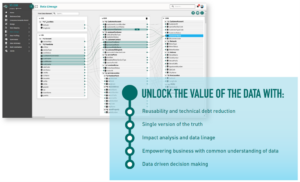
By using Enterprise Information Management and viewing data as a valuable asset, you can optimize its use for day-to-day decision-making. Affirma, a product recently introduced by Xtensible, helps with data design and governance.
Working with utilities over the years, on vastly different project, repeatedly, we encountered the need for an enterprise semantic model. Imagine this model being used, many times, transformed into something else, and used again and again–not just by you, but by different business systems, utilized by internal as well as external stakeholders. And suddenly there are new technologies, a focus on sustainability and changing consumer behaviors, resulting in additional usage of your existing model, and by the way, it also needs to be expanded. How do you create and sustain a semantic model for a utility in a world where change is constant, and systems are bought, replaced, and retired, so data at-rest and data in-motion, can be effectively utilized? How do you not accrue technical debt in this changing environment?
The enterprise semantic model you created does not do much good where it sits, but rather it needs to be distributed to a variety of systems and end-users. Reduction and transformation are a must. And inevitably, there will be changes in the model. The potential for chaos is significant. Without initial design and the ability to map lineage, you run the risk of using distorted and bad data. Therefore, your work begins even before a new system, or an asset for example, is procured. A guiding principle is to design, manipulate and nurture your semantic model, so that sharing across analytic platforms, systems for operations, and all corporate systems and stakeholders reduces errors and risk, and allows for quick dissemination.
Transitioning via an orderly methodology
Take a moment and look at how stakeholders work together today and the systems they use. Chances are that decision-makers and executors have limited interaction and coordination, resulting in disjointed efforts to execute corporate strategy. This is then reflected in the data and its duplication. For optimized use of data to become a reality, cooperation and consistency is needed, not only related to semantic model management but also for decision-making and workflows associated with corporate systems.
As Is and To Be
Through design and data lineage, you can track the lifecycle of data. Where did it come from? Where is it going? What is changing the data, and how is it changing? By capturing metadata along the way, you can understand the full data flow. A modern lineage implementation will allow the user to monitor, collect, analyze, and visualize the data as it travels through the processes of an enterprise while managing the complete data lifecycle.
By using Enterprise Information Management and viewing data as a valuable asset, you can optimize its use for day-to-day decision-making. Affirma, a product recently introduced by Xtensible, helps with data design and governance. Affirma is a product for your “As Is” state and your “To Be” state, and the orderly transition from one to the other, including dissemination, in support of the many different components of Enterprise Information Management.
The Bits and Pieces to make it work
Reference models are the inputs for your enterprise semantic model. From here, you design what data goes where, followed by data mapping and data transformation. Data lineages provide a single version of truth and shows how change will impact current and future states. Data profiling tells you about the quality of your data. Data governance and a common definition of data go together. Build automation finally results in code generation for deployment.
“Taking a design-first approach allows an organization to gain more value from its investments by design. Our mission is to provide utilities with a seamless understanding of and access to all the data, all the time, across the entire organization,” says Michael Covarrubias, VP of Strategy and Solutions.
Affirma – Thinking Big and Moving Forward
Enterprise Information Management and a design first approach can easily become overwhelming by its links to corporate vision and at the same time the excruciating attention to detail needed to work with the model and data. Xtensible provides strong support for your data design and managements objectives through our product Affirma, a technology independent approach, with code generation for your business systems. Xtensible recognizes the rising challenges that organizations are facing and are actively making advancements in this area by building a data management platform incorporating standards, design, and lineage to deliver both useful and reliable data.
Interested in learning more about Affirma and how it can help you with data governance, data lineage and enterprise information management? Speak to a member of the Xtensible team.













